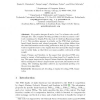6 search results - page 1 / 2 » Decoding Random Binary Linear Codes in 2 n 20: How 1 1 = 0... |
EUROCRYPT
2012
Springer
11 years 7 months ago
2012
Springer
Decoding random linear codes is a well studied problem with many applications in complexity theory and cryptography. The security of almost all coding and LPN/LWE-based schemes rel...
APPROX
2008
Springer
13 years 6 months ago
2008
Springer
A (q, , )-locally decodable code (LDC) C : {0, 1}n {0, 1}m is an encoding from n-bit strings to m-bit strings such that each bit xk can be recovered with probability at least 1 2 +...
CODCRY
2011
Springer
12 years 8 months ago
2011
Springer
Fix positive integers B and w. Let C be a linear code over F2 of length Bw. The 2-regular-decoding problem is to find a nonzero codeword consisting of w length-B blocks, each of w...
IMA
1995
Springer
13 years 8 months ago
1995
Springer
An algorithm for finding small-weight words in large linear codes is developed and a precise analysis of its complexity is given. It is in particular able to decode random [512,256...
VTC
2010
IEEE
13 years 3 months ago
2010
IEEE
— In this contribution we propose a robust H.264 coded wireless video transmission scheme using iteratively decoded self-concatenated convolutional coding (SECCC). The proposed S...

